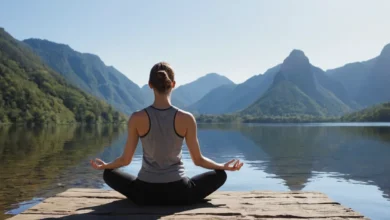How to Manage Anxiety Naturally: Tips and Techniques

Anxiety can be overwhelming, affecting daily life and overall well-being. While professional help is essential for severe cases, many natural methods can complement treatment and help manage anxiety. This guide offers practical tips and techniques to promote calmness and reduce anxiety naturally.
1. Practice Mindfulness Meditation
Mindfulness meditation encourages living in the moment, helping to alleviate anxiety. By focusing on your breath and thoughts, you can learn to observe them without judgment.
- Tip: Start with just five minutes a day, gradually increasing the duration. Apps like Headspace or Calm can provide guided sessions to ease you into the practice.
2. Incorporate Regular Exercise
Physical activity is a powerful tool for reducing anxiety. Exercise releases endorphins, improving mood and reducing stress levels.
- Tip: Aim for at least 30 minutes of moderate exercise most days. Activities like walking, yoga, or dancing can be both enjoyable and effective.
3. Maintain a Balanced Diet
Nutrition plays a crucial role in mental health. A diet rich in whole foods, such as fruits, vegetables, lean proteins, and healthy fats, can support overall well-being.
- Tip: Limit processed foods and sugar, which can lead to mood swings. Consider incorporating omega-3 fatty acids, found in fish and flaxseeds, to support brain health.
4. Establish a Consistent Sleep Routine
Sleep is essential for managing anxiety. Lack of sleep can exacerbate feelings of stress and worry.
- Tip: Create a relaxing bedtime routine, aiming for 7-9 hours of quality sleep each night. Avoid screens an hour before bed and consider calming activities like reading or gentle stretching.
5. Try Herbal Remedies
Certain herbs have been shown to help alleviate anxiety symptoms. Chamomile, lavender, and ashwagandha are popular natural options.
- Tip: Consult with a healthcare provider before starting any herbal supplements to ensure they are safe and effective for you.
6. Utilize Deep Breathing Techniques
Deep breathing exercises can activate the body’s relaxation response, helping to reduce anxiety quickly.
- Tip: Practice the 4-7-8 technique: inhale for four seconds, hold for seven seconds, and exhale for eight seconds. Repeat several times to feel calm.
7. Connect with Nature
Spending time in nature can have a calming effect on the mind and body. Nature walks, gardening, or simply sitting outdoors can improve mood and reduce stress.
- Tip: Aim to spend at least 20 minutes outside each day. Consider activities like hiking, picnicking, or visiting a local park.
8. Build a Supportive Network
Social support is vital for managing anxiety. Connecting with friends and family can provide comfort and understanding during difficult times.
- Tip: Reach out to loved ones regularly, share your feelings, and engage in social activities to foster strong connections.
9. Limit Caffeine and Alcohol Intake
Both caffeine and alcohol can increase anxiety levels. Moderation is key for maintaining a balanced mood.
- Tip: Opt for herbal teas or decaffeinated beverages and limit alcohol consumption to minimize its impact on your mental health.
10. Explore Creative Outlets
Engaging in creative activities can serve as a healthy outlet for anxiety. Whether it’s painting, writing, or playing music, expressing yourself creatively can provide relief.
- Tip: Set aside time each week for creative pursuits that resonate with you. This can foster mindfulness and help shift focus away from anxiety.
Conclusion
Managing anxiety naturally involves a holistic approach that encompasses lifestyle changes, mindfulness practices, and self-care techniques. By incorporating these tips into your daily routine, you can foster a sense of calm and well-being. Remember, it’s essential to seek professional help if anxiety becomes overwhelming.





